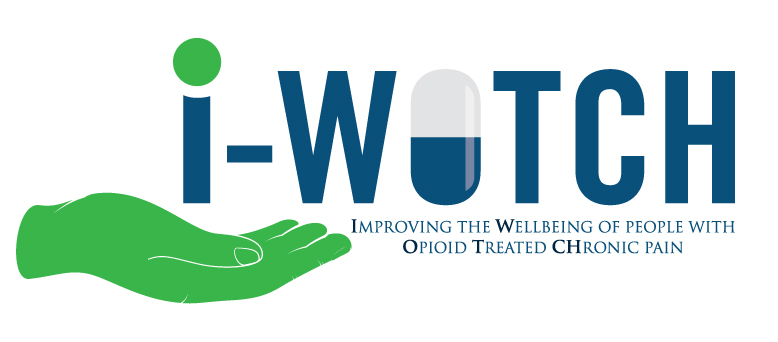I-WOTCH Study Summary & Results
Improving the Wellbeing of People with Opioid Treated Chronic Pain
Previous work has found that self-management and cognitive behavioural therapy (a type of talking therapy that changes the way people think and behave) can support pain management. In the I-WOTCH study, these techniques were adapted and developed into a self-management course to help people cut down on opioid use.
The aim of the study was to test the effectiveness and cost effectiveness of this new self-management program in helping people to reduce their opioid use and improve quality of life.
608 adults living in the UK took part in the study. Participants were randomly allocated (by chance alone) to be in one of two treatment groups:
Group 1
Usual GP care plus:
- an information booklet about opioids
- a relaxation CD
More about usual GP care plus an information booklet:
Participants received an information booklet about opioids explaining pain, and the pros and cons of taking opioid painkillers. They also received a relaxation CD, with instructions on how to use it, and were asked to practice the relaxation techniques. Participants received their usual GP care for the duration of the study.
Group 2
The same as Group 1, plus a support programme which included:
- a 3-day group course at a local venue. This was led by a trained nurse and a trained person with experience of reducing their opioids prescribed for long-term pain
- course handouts
- two appointments at a local venue with a nurse to discuss slowly reducing (tapering) opioids
- two follow-up phone calls
- a Mindfulness CD
- a DVD about living well with long-term pain
More about the I-WOTCH support programme:
Trial participants in Group 2 received an information booklet about opioids and relaxation CD alongside their usual GP care. They met and spoke on the phone with I-WOTCH nurses to talk about their opioid reduction. They were also invited to attend a short course led by two tutors, which ran over 3 days. During the course participants were encouraged to talk with others taking opioids for long-term pain and to think about their own lifestyle, experiences and behaviours. The course included sessions about:
- Understanding pain
- Coping techniques
- Posture and movement advice
- Relaxation techniques
- Short and long term effects of opioids
- The benefits of a slow, supervised reduction of painkillers
- How to manage any withdrawal symptoms
- Pain control after opioids
Questionnaires
Both groups 1 and 2 were asked to complete a weekly diary for the first four months of the study. The diary contained two short questions about quality of life and any withdrawal symptoms (from reducing their opioid dose).
Both groups 1 and 2 were also asked to complete three questionnaires about their everyday functioning at 4, 8 and 12 months after joining the study.
Activities of daily living were measured using the Patient-Reported Outcomes Measurement Information System (PROMIS) Pain Interference Short Form (8A)(PROMIS-PI-SF-8A). Alongside opioid use data, this was the primary outcome measure for the study.
Who participated in the study?
608 people volunteered and joined the study from 191 primary care centres (GP Practices) in the Midlands and North East. 60 percent were female and the average participant age was 61 years. All those that took part in the study had been prescribed opioids, long-term pain, not related to cancer, for at least 3 months.
What were the results of the study?
The key results are summarised below:
- At one year, there was no difference between the groups in how pain affected their lives
- In the best available care group, one in 14 people (7%) were taking no opioids at one year
- In the I-WOTCH intervention group, one in four people (29%) were taking no opioids at one year
- Pain was neither better nor worse in either group
- The I-WOTCH intervention may represent good value for the NHS
The clinical study results are published in the Journal of the American Medical Association (JAMA), a scientific journal (doi:10.1001/jama.2023.6454).
A process evaluation of the I-WOTCH group-based intervention was also undertaken. Data showed that the I-WOTCH intervention was well delivered, well received and useful for most interviewees. Being ‘the right time’ to taper and having support throughout tapering, emerged as important factors within the context of living with chronic pain (ref. doi:10.1136/bmjopen-2023-074603Link opens in a new window).
How has this study helped patients and researchers?
The trial showed that the I-WOTCH support programme intervention can help some people living with chronic non-malignant pain to stop using strong opioids, without affecting how pain interferes with their lives.
Contact:
Email:
Publications:
Links to all journal publications about I-WOTCH can be found here.
News:
A plain language Summary is available on the NIHR Evidence website here.
Video:
The video below, by Dr Andrea Furlan, explains more about the I-WOTCH trial and findings
(Video also available on YouTube)
